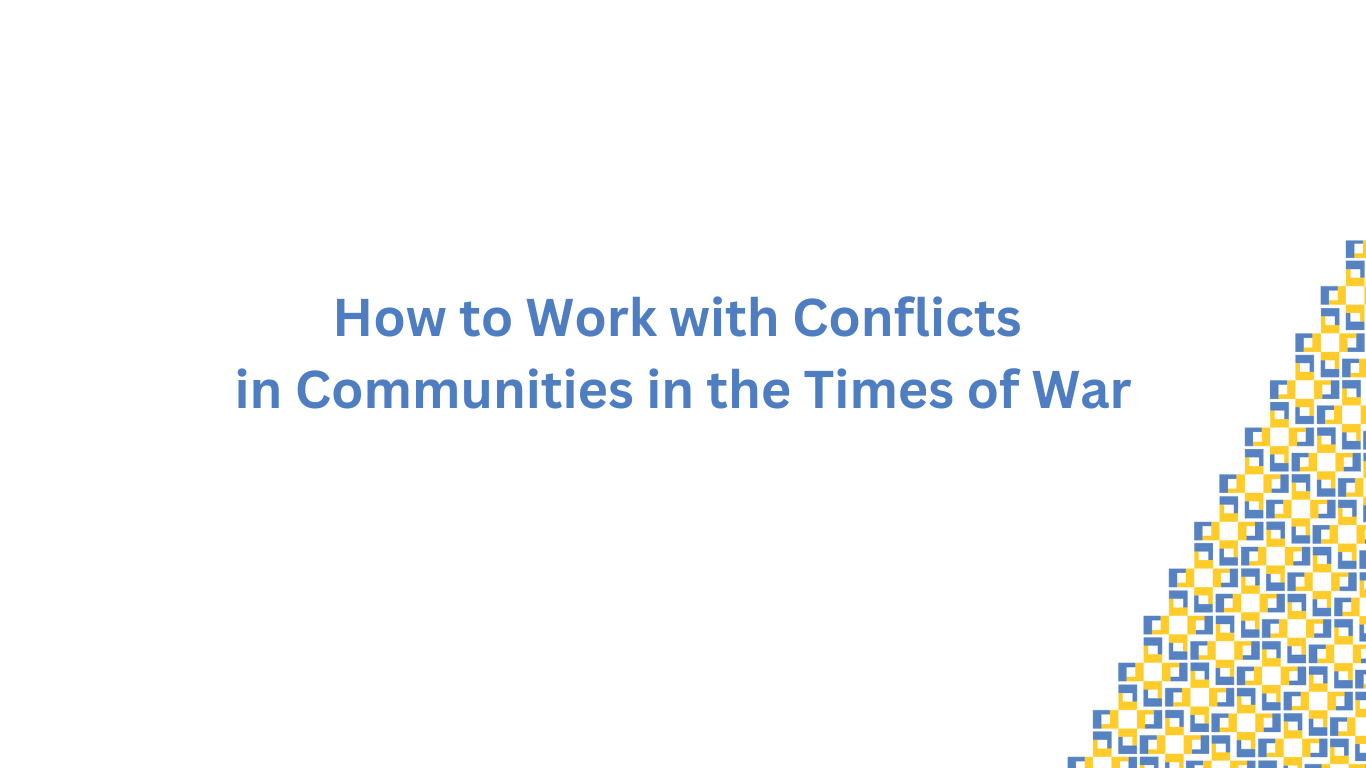How to Work with Conflicts in Communities in the Times of War

A guide to the concept of mobile groups.
PREFACE
This methodical guide was authored by practicing professionals in the field of conflict management, mediation, dialogue facilitation and psychology.
In early spring of 2022, we developed a concept for working with conflicts in war-time and, together with mobile teams, spent the next three months improving it.
We updated and improved our ideas based on the results obtained at the piloting stage, which is why this publication contains both the initial concept and the additions that we introduced after piloting as part of the project «Initiative to Support Interaction and Conflict Management in Places that Provide Assistance to IDPs» as well as relevant recommendations.
ABOUT THIS METHODICAL GUIDE
This guide develops the concept of mobile teams to deal with conflicts resulting from the large-scale internal displacement of the population in Ukraine. Each mobile team consists of a mediator and a psychologist. The full-scale invasion has created challenges for Ukrainian cities and communities concerning dealing with the influx of large numbers of IDPs. We are working through it, but these resources will help us build stronger communities and in long-term perspective help our citizens to be integrated into their new communities, which might result in decrease of number of refugees from Ukraine.
By describing in detail both the concept and the piloting results, we aim to promote the development and scaling of similar initiatives and help organisers and donors improve the effectiveness of projects aimed at resolving conflicts, pre- venting escalation and relieving conflict tension, as well as helping them take into account the nuances of such work. We believe that our guide will be of interest and use to:
- Civil society organisations that help IDPs: here, they will find algorithms and approaches to dealing with conflicts in locations, experience of imple-menting these algorithms in practice, and findings of mobile teams, which will be useful to CSOs both in their own work and when implementingsimilar projects;
- Local government, which will learn how to improve the atmosphere in host communities and how to organise work aimed at dealing with con- flicts using our mobile teams as an example;
- Mediators, dialogue facilitators and psychologists, as well as experts working in the field of communications, who will find here a methodol- ogy for dealing with conflicts at the grassroots level during wartime and new ideas for such work, and learn how they can work during this time, how to make their work more effective and what tools they can use;
- Donors and international organisations, who can learn about different approaches to conflict management, opportunities, and mechanisms for ensuring social cohesion in Ukrainian communities, and the nuances of implementing similar donor-backed projects during wartime showcased by the mobile teams’ relevant practical experience.
Our initiative was the first in 2022 to not just address the mental state of IDPs but also to combine different methodological avenues and take a comprehensive approach to the social communication sphere (in the context of conflicts of various levels). This issue has not been given the attention it deserves, even though there exists a real need for work in the field of conflict-related communications. Focusing on conflicts and communication concerning IDPs and their communities was an innovative idea proposed by Hanna Homeniuk, Manager for Humanitarian Protection and Conflict Mitigation at International Charitable Foundation Caritas Ukraine. Since then, we have shaped it into a comprehensive, but flexible model that can be scaled, updated to fit the tasks and competencies of the implementers and adapted in response to any social changes in communities and the country as a whole.
At the time the initiative was conceived and developed, the experts involved were dealing with a high level of uncertainty and rapid changes in the field. In light of this, our goal was to have a flexible and highly adaptable model that would also be sufficiently sustainable and anti-fragile.
We realise that this concept cannot be immutable (especially during a war) as its components and aspects will have to be constantly discussed and adapted to new realities in the field. Our experience shows that the main principles and approaches described in this publication remain relevant at every stage of project implementation. We share our experience and recommendations, outlining both mandatory and variable components to allow our methodology and experience to be adapted to the specific needs of similar projects.
The mobile teams project was piloted in four cities — Ivano-Frankivsk, Lviv, Ternopil, and Chernivtsi.
You can get acquainted with the text by following the link.
